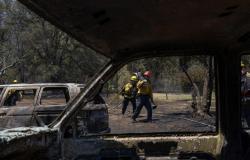
This Thursday, May 30, while the Bouches-du-Rhône Assize Court confronted Jacques Mariani with his main accuser (a highlight of the trial to which we will return in our edition of Saturday June 1 due to a closed session) , Richard Guazzelli’s lawyers detailed at length the reasons why, challenged by their client, they decided to leave the hearing in the company of the majority of their colleagues. My Olinka Malaterre, Jean-Charles Vincensini and Martin Reynaud speak exclusively for Corse-Matin.
Ten days after leaving the audience, are you sticking to your position?
Olinka Malaterre: We regret nothing. Should we compromise on fundamental rights of defense? Should we have accepted this sentence from the president of the court during the debates: “We are only in the first instance” ? As if the quality of justice at first instance was not obligatory. The answer was obvious. We had no choice.
Jean-Charles Vincensini: What we are witnessing today is the materialization of the fears which motivated our decision. When we read your articles since we left, we realize that there are witnesses, experts, to whom no one wants or can ask useful questions. That the jurors have as their sole companion the three professional judges.
Is your decision irreversible?
Martin Reynaud: Absolutely. We do not compromise on the guiding principles of the criminal trial.
Other lawyers, notably those of Jacques Mariani, have changed their position and returned to the defense benches. Does this backpedal undermine the solidarity you showed when you collectively withdrew?
J.-CV: They naturally have the right to change their mind, that is not our concern. This decision is up to everyone.
The trial continues despite everything in a degraded context. Doesn’t this risk further undermining citizen confidence in justice?
MR: We are very concerned by the progressive deterioration of the dialogue between magistrates and lawyers. When we invoke fundamental principles, such as the presumption of innocence, the oral nature of the debates, loyalty in the search for proof, some judges see it as an attack on their power, as a posture of defiance, sometimes even as an artifice. This is more than regrettable. Because it is our mission, and nothing else, to remind people that in a rule of law, every trial must be fair.
However, informal exchanges with the president of the Assize Court preceded this standoff. Was there no way to agree to continue this trial?
J.-CV: We had the feeling that, in principle, it was not possible to postpone this trial. As a result, the court may have been tempted to believe that our position was part of a judicial strategy when it was only an expression of the minimum requirements of a fair trial. Against these concerns, we were opposed to holidays imposed on police officers.
OM: I would add that this meeting with the president took place at the request of the defense. For us, it was unthinkable that the court would not find a solution. We had good will and hoped that the court would ensure that the investigators could come quickly, at the start of the examination of the facts. But we faced a total blockage, due to leave linked to the Olympic Games and constraints linked to the overload of the role of the Aix-en-Provence criminal court.
Why did you consider that the presence of investigators on the stand at the start of the trial was essential?
J.-CV: The practice is that the investigators are heard at the start of the hearing. Firstly because, to the jurors, they tell the general story, they set the scene. Then each witness comes to shed particular light on an episode, a compartment of this general story that everyone then understands. Procedurally, then, at the assizes we cannot question a witness on the basis of statements made by another witness, even a police officer, whose hearing is scheduled later in the calendar. Which means that in this trial, everything that the investigators found in the file could not be discussed with the witnesses heard before them. What is unbearable for us is that the jurors are not able to understand what they are going to judge. This is the only reason that justified our leaving this hearing.
Some observers of this trial speak of delaying tactics by the defense. What do you answer them?
J.-CV: There is a material element which puts an end to this debate: if we had entered this courtroom with the desire not to be judged, Richard Guazzelli would not have spoken from the second day for three hours while he was silent for seven years. We cannot say everything and anything.
OM: And above all, delaying why? What would have been the consequence of dismissal? Our client would have remained in prison awaiting trial. And what does he gain by having challenged his lawyers? To no longer defend yourself? Nothing. But he did not want, and neither did we, to participate in a trial that had become unfair.
Should this speech by the main accused on the examination of their personality be extended to explain the facts of which they are accused?
MR: This trial would have been useful for revealing the truth. It was the goal. This is all a huge waste.
According to certain indiscretions, Me Frank Berton, lawyer for Christophe Guazzelli, would have taken the lead in your revolt, without necessarily involving all the colleagues in the decision-making.
J.-CV: That’s not true. The decision was made by everyone independently. Me Berton is an experienced lawyer. If he had a professional practice of obstructing trials, it would be known. Same for us. We hoped for a dignified audience and calm debates. But the inflexibility of the court no longer allowed it.
The trial continues regardless. There will be a verdict. Don’t you feel like you’ve lost your grip?
J.-CV: It was never a question for us of considering a trial hearing like playing arm wrestling in a schoolyard. This is not our vision of things. It is not the right reading to say that there are some who lose and others who win. Moreover, it is this type of reading which tenses up positions. Everyone does their job as best they think they can.
OM: The stakes are too high to compromise on defense rights. The defendants were right not to agree to take the forced march of the path to an unfair trial. And we hope that what happened will, on the contrary, allow us to have more serenity, a real awareness and a consensus between lawyers and magistrates on the conduct of future trials and on the conditions of healthy Justice.
Are you already planning towards a possible appeal trial?
OM: We remain attentive to what is happening but we obviously cannot answer you at this stage.





